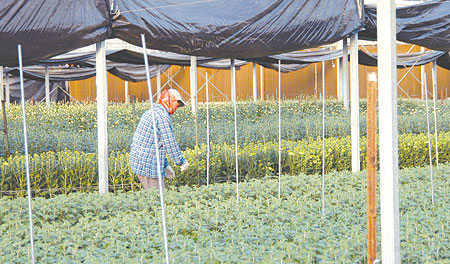By: Randa Mousa
Ethiopia’s multifaceted relations with Saudi Arabia gained new momentum especially investing in energy and agriculture for achieving food security to the kingdom, starting with ways of scaling up Saudi investors participation, bolstering involvement in the agriculture and livestock sectors and supporting Ethiopia’s development projects.
Under the economic reform programme that launched last year, Saudi Arabia seeks other venues than oil to serve electricity requirements in the future. Saudi Arabia is implementing an economic restructuring plan known as Vision 2030 that reduces its reliance on oil thereby transforming the economy and become one of the top investing countries in the world. Due to this, the country is eyeing Ethiopia as one of its top investment destinations. Ethiopia has a huge animal wealth that is estimated at 44 million cows and 32 million heads of sheep and 29 million goats, this wealth that ranked Ethiopia the first in Africa owning livestock, and tenth in the world.
In 2008, King Abdullah “launched the initiative of Saudi agricultural investment abroad,” calling on the Saudis to travel abroad and buy land. The main motivation for this Saudi rush to invest abroad in land is the huge is rise in global food prices 2007-2008, when world prices for many agricultural commodities – especially grains such as wheat and rice – has more than doubled in a few months. King Abdullah’s initiative has been aimed primarily at ensuring food security for the Kingdom, including “the promotion of international food security and to encourage Saudi investors to take advantage of the resources and expertise abroad.”
Saudi investors (state and private) spending billions of dollars to buy up or lease large tracts of land all over the world. According to the Ethiopian Herald press, It was one of the first Saudi investment projects abroad in Gambella, a region in western Ethiopia, where a Saudi company invested in 10,000 hectares on lease for 60 years. Due to its limited water supply and the cost of desalination, agriculture has become Saudi Arabia’s’ priority for overseas investment. Ethiopia on the other hand offers wide investment opportunities that are crucial for Saudi in order to meet its goals of economic diversification in the agriculture, health care, retail and infrastructure sectors.
Some 22 investment projects implemented between 2010 and 2015, with an aggregate capital of 6.7 billion dollars, make Saudi the 4th largest country investing in Ethiopia, reported Ethiopian Investment Commission. In the year 2015/16 Saudi imported agricultural products worth 187.7 million USD from Ethiopia, according to Ministry of Trade. According to the Agricultural association of Saudi investors in Ethiopia, there are more than 400 Saudi investors in Ethiopia, pumping nearly 200 million dollars a year in agricultural areas and energy. Saudi Arabia has showed strong interest to start huge investments in animal’s fodder and energy sector cooperation projects with Ethiopia. Saudi businessmen have significant investments in Ethiopian coffee, Riyadh imports 80 thousand tons per year, making it the largest importers of Ethiopian coffee in the world.
In 2016, KSA bought close to 38 thousand tons of coffee from Ethiopia amounting to over 112 million USD. According to Ministry of commerce and investment, Saudi imports of live cattle and meat from Ethiopia amounts to $465.47 million, other than agricultural products worth $429.13 million and $262.7 million of flowers, and sesame $404.2 million, as well as $129.1 million from minerals. Saudi Arabia is to launch a renewable energy programme that is expected to involve investment of between $ 30 billion and $ 50 billion by 2023. Riyadh plans to start the first round of bidding for projects under the programme, which would produce 10 Giga watts of power.
Reporting its economic review about two months ago, the World Bank praised Ethiopia for its respectable economic performance with an average GDP growth of 8 percent in 2015/16.The government of Ethiopia is actively encouraging private sector investment with attractive incentive packages. Many nations are eyeing to invest in the nation due to various opportunities in the nation like its large population of about 100 million of which 50 percent are the youth.


